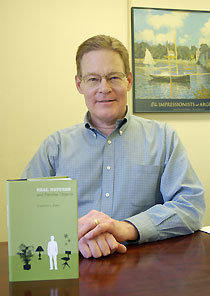Philosopher’s New Book A
Defense of Common Sense
 |
|
Tim Elder, professor and head of the philosophy department, at his office in Manchester Hall. |
|
Photo by Melissa Arbo
|
Common sense is all too uncommon, according to Professor Crawford “Tim” Elder.
In his new book, Real Natures and Familiar Objects (MIT Press, 2004), Elder, head of the philosophy department in the College of Liberal Arts and Sciences, sets out to defend common sense.
He argues, contrary to the views of many philosophers, that such familiar objects as trees, humans, glaciers and snowflakes, as well as man-made objects, do exist.
“Over the past 80 years surprisingly few philosophers writing in the area of metaphysics have been willing to claim that there genuinely exist in the world such things as desks and screwdrivers, trees and dogs, and people as beings whose actions are often governed by how they judge the world to be,” says Elder, who describes himself as a “die-hard realist.”
He developed his arguments in opposition to two main schools of thought: one, that things exist only in people’s minds; the other, that the only things that can be said to exist are microparticles of matter.
Elder defines familiar objects as those ranging in size from a cell to the sun, but not including things that are “so small or big that only scientific theory could tell you they’re there, like a galaxy or a solar system.”
He says the most popular view replacing common sense has been that what exists in the world are just the subatomic particles recognized by physics. Elder dismisses this concept.
“Once you’ve granted 83 million microparticles, why not a wallet, for example?” he says. “Why should there be only a one-level ontology?”
He says objects have a different existence from the aggregate of their component particles.
“If you knock out one component of the aggregate, the object still exists,” he says. “Or you can add microparticles by, say, polishing the wallet. It’s no longer the same collection of microparticles, but it is the same wallet.”
He says living creatures demonstrate the case even more clearly: “We know that on average no cell stays in the body more than seven years, so almost none of the atoms that are you now were you 10 years ago.”
Elder says the few philosophers willing to defend the common-sense approach to familiar objects have generally done so from an idealist point of view. It has been posited, for example, that human beings experience the world as if it contained familiar objects, but that familiar objects do not exist on their own.
Elder argues, on the other hand, that human beings do exist and that they are surrounded by many of the objects in which common sense believes, including man-made items and biological entities shaped by natural selection. He also contends that these familiar objects have essential properties, whose status as essential does not depend on human thought – they are “mind-independent.”
Elder credits UConn colleague Ruth Millikan, professor emerita of philosophy, for the idea that not only are human speech organs and brains the products of natural selection, but that their thoughts and utterances are also the products of natural selection. Thinking and talking are events that occur only within nature. So, the argument goes, it makes no sense to say that people structure the objects of nature. Instead, the objects of nature structure people and their thoughts.
Thoughts and emotions he regards as biological – as being physically embodied by the brain. “I’m a materialist,” he says. “Will? Intention? It’s switching and glitching up there.”
Elder looks to science and scientific method for the answers. “The real story
is told by the sciences of the material world – evolutionary biology, neuroscience,
physics, and so on,”
he says.
He has little time for “a priori arguments that this or that can’t exist. Philosophers could get away with that until about 1650,” he says. “Since then, that approach seems cheeky. Philosophers should pay attention to what the empirical sciences are finding out.”
Elder says he once dreamed of being a scientist.
“When I was a kid, I wanted to be a physicist,” he says. “Then my mother bought me a copy of Bertrand Russell’s History of Philosophy, and I just kept reading.”
He earned a bachelor’s degree and a Ph.D. from Yale University, where he wrote a doctoral dissertation about why Hegel – generally seen as an idealist – is a realist. He joined the UConn faculty in 1974.
He says his book is controversial, but he doesn’t mind “the persona of the folksy, hayseed, common-sense philosopher.”
“What I’m trying to say,” says Elder, “is that if we respect
scientific method and the ways in which we think we can establish knowledge in the
sciences, that’s the way we should believe in familiar objects and people.”

